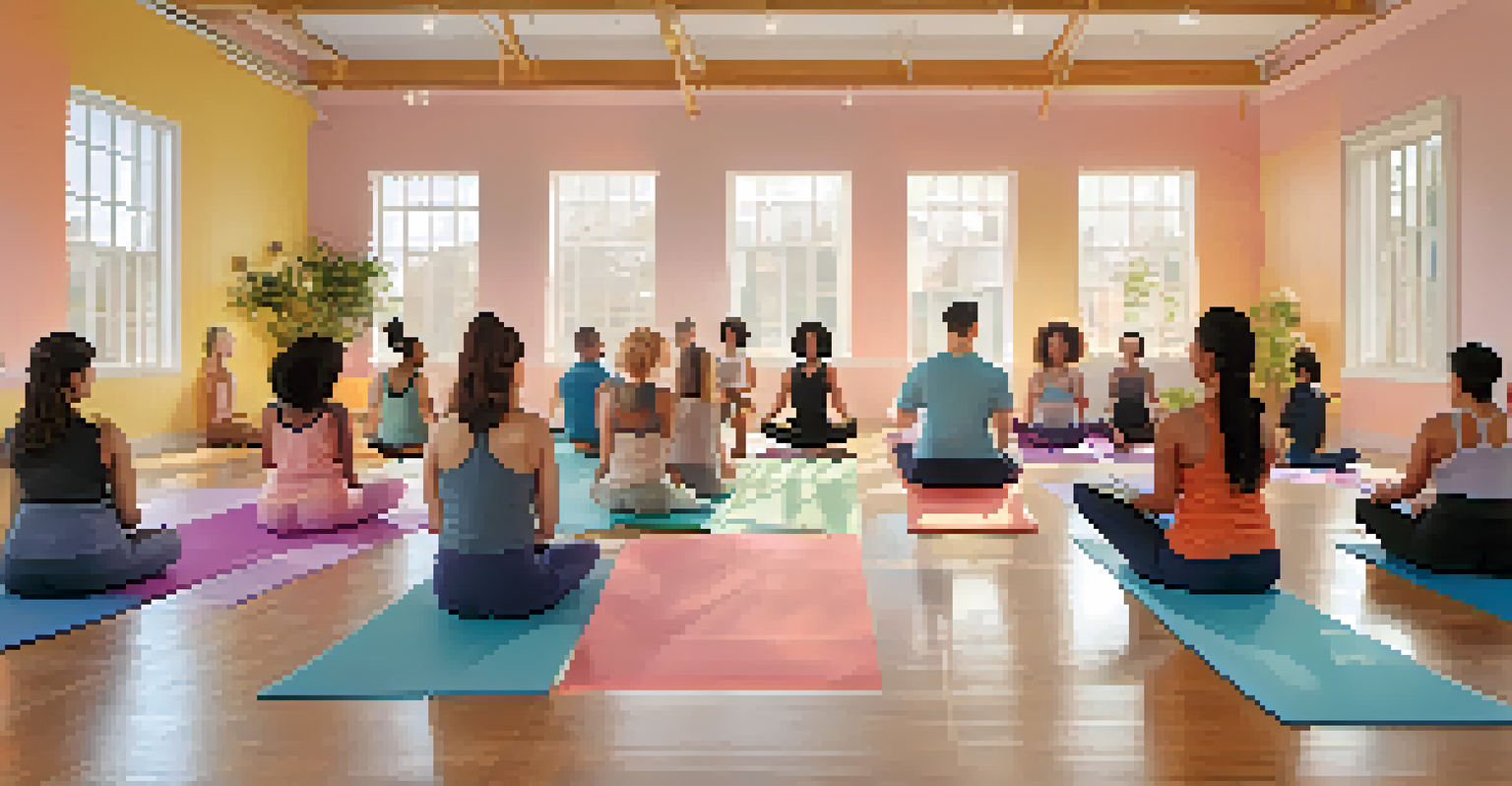Setting Realistic Goals for Your Yoga Practice as a Beginner

Understanding Your Current Skill Level in Yoga
Before you dive into your yoga practice, it's important to assess your current skill level. Are you completely new to yoga, or have you dabbled in it before? Understanding where you stand helps in setting realistic goals that won't overwhelm you.
Yoga is not about touching your toes, it’s what you learn on the way down.
Think of your skill level as a starting point on a map. Just as you wouldn't plan a road trip without knowing your starting location, you shouldn't set goals without knowing where you are. This will help you chart a course that feels achievable.
Taking a moment to reflect on your experience not only helps in goal-setting but also boosts your confidence. Remember, every expert was once a beginner, so embrace your journey with an open heart.
Identifying Your Motivations for Practicing Yoga
What draws you to yoga? It could be the desire to improve flexibility, relieve stress, or find a sense of community. Identifying your motivations is key to setting goals that resonate with you personally.

For instance, if your goal is to reduce stress, you might aim to practice mindfulness during each session. Alternatively, if you're looking to enhance physical strength, you could focus on specific poses that challenge you.
Assess Your Yoga Skill Level
Understanding your current skill level helps set realistic goals for your yoga practice.
When your goals align with your motivations, you're more likely to stay committed. Each time you step onto the mat, you'll be reminded of why you started, which will keep you inspired along the way.
Setting SMART Goals for Your Yoga Journey
A great way to ensure your goals are realistic is by using the SMART criteria—Specific, Measurable, Achievable, Relevant, and Time-bound. For example, instead of saying, 'I want to get better at yoga,' you might say, 'I want to attend yoga class twice a week for the next month.'
The journey of a thousand miles begins with one step.
This approach brings clarity to your goals, making them easier to track. By breaking them down into specific actions, you can celebrate small victories, which are essential for motivation.
Setting SMART goals not only enhances your focus but also allows you to adjust your plans as needed. If something isn't working, you can easily tweak your approach without feeling discouraged.
Creating a Consistent Practice Schedule
Consistency is key in any practice, especially yoga. Establishing a regular schedule can help you develop a routine that fits seamlessly into your life. It’s about finding what works best for you, whether that's morning sessions, evening stretches, or weekend classes.
Think of your practice schedule as a date with yourself. Just like you wouldn't cancel an important meeting, treat your yoga time with the same respect. This commitment will help you build a habit over time.
Set SMART Yoga Goals
Using the SMART criteria ensures your yoga goals are specific, measurable, and achievable.
As you become more consistent, you'll notice improvements in your flexibility and mental clarity. Remember, it's not about how often you practice, but rather the quality and intention you bring to each session.
Embracing Progress Over Perfection
In yoga, as in life, it's crucial to focus on progress rather than perfection. Each time you step onto the mat, you're engaging in a journey of self-discovery and growth. Celebrate the small wins, whether it's holding a pose a little longer or feeling more relaxed.
This mindset shift can alleviate the pressure to perform flawlessly. Instead of comparing yourself to others in class, remember that everyone is on their own unique path, and your journey is just as valid.
By embracing progress, you’ll cultivate a more positive relationship with your practice. This attitude not only enhances your experience but also encourages you to keep coming back for more.
Incorporating Mindfulness into Your Yoga Practice
Mindfulness is a powerful tool that can significantly enhance your yoga experience. By being present in each moment, you can deepen your connection to your body and breath. This awareness allows you to set intentions for your practice and helps you stay focused.
Consider starting each session with a few moments of deep breathing or meditation. This practice can ground you and create a sense of calm before you begin your physical practice.
Embrace Community Support
Finding a supportive yoga community can enhance your experience and keep you motivated.
As you develop mindfulness, you'll find it extends beyond your yoga mat and into your daily life. This holistic approach not only enriches your practice but also fosters a sense of peace and clarity.
Finding Community and Support in Your Yoga Journey
Yoga is often about connection, not just with yourself but also with others. Finding a supportive community can make your journey more enjoyable and fulfilling. Look for local classes, online groups, or social media communities where you can share experiences and tips.
Having a support system encourages accountability and can motivate you to stick to your goals. When you connect with others who share similar aspirations, you'll find inspiration in their stories and progress.

Remember that everyone has their own challenges and triumphs in their yoga journey. By sharing your experiences, you create bonds that can uplift and encourage you as you navigate your practice.